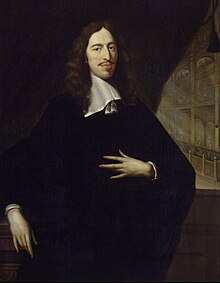Pensionary: Difference between revisions
→Historical development: denomination |
m Punctuation error |
||
| Line 1: | Line 1: | ||
{{no footnotes|date=January 2015}} |
{{no footnotes|date=January 2015}} |
||
A '''pensionary''' was a name given to the leading functionary and legal adviser of the principal town corporations in the [[Low Countries]] because they received a [[salary]] |
A '''pensionary''' was a name given to the leading functionary and legal adviser of the principal town corporations in the [[Low Countries]] because they received a [[salary]] or pension. |
||
==Historical development== |
==Historical development== |
||
Revision as of 16:07, 20 August 2019
This article includes a list of references, related reading, or external links, but its sources remain unclear because it lacks inline citations. (January 2015) |
A pensionary was a name given to the leading functionary and legal adviser of the principal town corporations in the Low Countries because they received a salary or pension.
Historical development
This section may require copy editing for grammar, style, cohesion, tone, or spelling. (August 2019) |
Initially, the official exercising this role was referred to as clerk or advocate. The office originated in Flanders. The earliest pensionaries in the county of Holland were those of Dordrecht (1468) and of Haarlem (1478). The pensionary conducted the legal business of the town and was the secretary of the town council and its representative and spokesman at the meetings of the Provincial States. The post of pensionary was permanent, and his influence was great.
In the States of the province of Holland pensionary of the order of nobles (Ridderschap) was the foremost official of that assembly and, until the death of Oldenbarneveldt in 1619, he was named Land's Advocate, or more shortly the advocate. The importance of the advocate was much increased after the outbreak of the revolt in 1572, and still more so during the long period 1586–1619 when John van Oldenbarneveldt held the office. The advocate drew up and introduced all resolutions, concluded debates, and counted the votes in the Provincial Assembly. When it was not in session, he was a permanent member of the college of deputed councilors who carried on the administration. He was the minister of justice and finance.
All correspondence passed through his hands, and he was the head and the spokesman of the delegation, who represented the province in the States General. The conduct of foreign affairs, in particular, was entrusted almost entirely to him.
After the downfall of Oldenbarneveldt the office of lands advocate was abolished, and a new post, tenable for five years only, was erected in its place with the title of Raad-Pensionaris or Pensionary of the Council, usually called by English writers Grand Pensionary. The first holder of this office was Anthony Duyck, Jacob Cats and Adrian Pauw, in the days of the stadtholders Frederick Henry and William II of Orange-Nassau had to be content with lessened powers, but in the First Stadtholderless Period (1650–1672) the grand pensionary became even more influential than Oldenbarneveldt himself, since there was no prince of Orange filling the offices of stadtholder, and of admiral and captain-general of the Union. From 1653–1672 Johan de Witt, re-elected twice, made the name of grand pensionary of Holland forever famous during the time of the wars with England. The best known of his successors was Anthony Heinsius, who held the office from 1688 to his death in 1720. He was the intimate friend of William III, and after the decease of the king continued to carry out his policy during the stadtholderless period that followed. The abolishment of the office occurred after the conquest of Holland by the French in 1795.
Further reading
- Robert Fruin, Geschiedenis der Staats-Instellingen in Nederland, The Hague, 1901
- G. W. Vreede, Inleiding tot eene Gesch. der Nederlandsche Diplomatie (Utrecht, 1858). (G. E.)

References
- This article incorporates text from a publication now in the public domain: Edmundson, George (1911). "Pensionary". In Chisholm, Hugh (ed.). Encyclopædia Britannica. Vol. 21 (11th ed.). Cambridge University Press. p. 122.
